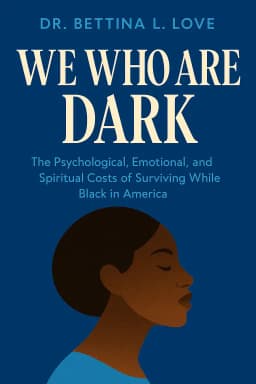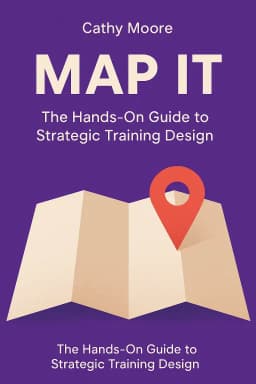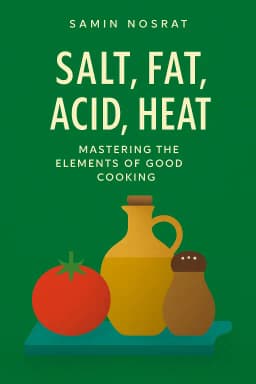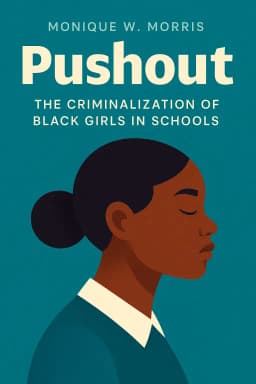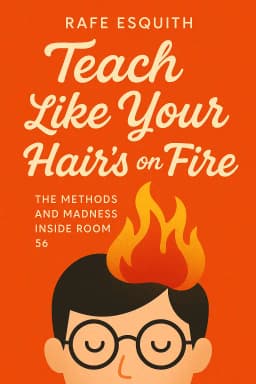
The Anti-Fear Classroom
The Methods and Madness Inside Room 56
Golden Hook & Introduction
SECTION
Laura: A teacher once told his fifth-graders, "Your future depends on this test!" and got so intense he was actually spitting on them. Sophia: Oh, that is a nightmare scenario. I think I just had a flashback to middle school math. Laura: Well, what if I told you that teacher was doing exactly what most schools, in a less dramatic way, do every day? And that the real path to success is the polar opposite. Sophia: Okay, you have my full attention. That sounds like a direct challenge to, well, my entire education. Laura: It is. That intense story, believe it or not, comes from today's book: Teach Like Your Hair's on Fire by Rafe Esquith. Sophia: Rafe Esquith... he's the teacher who became famous for his work in a really tough, low-income neighborhood in Los Angeles, right? The one who got his fifth-graders to perform full-length Shakespeare plays. Laura: Exactly. He won the National Medal of Arts for it. His whole philosophy is a direct challenge to that 'teach-to-the-test' pressure. And it all starts by dismantling the most common tool in the classroom: fear.
The Anti-Fear Classroom: Building a Foundation of Trust
SECTION
Sophia: Fear. I mean, that feels like the default setting for so much of school. Fear of getting the answer wrong, fear of the teacher calling on you, fear of a bad grade. Laura: Precisely. And Esquith argues that a classroom managed by fear is fundamentally broken. It prevents real learning. He tells this absolutely shocking story to illustrate the point. He calls it "The Teacher and Alex's Backpack." Sophia: I'm almost afraid to ask. What happened? Laura: A third-grade boy, Alex, had a messy backpack. The teacher, trying to teach him a "lesson," yells at him, dumps the entire contents of the backpack onto his desk in front of everyone, takes a picture to shame him with at Back-to-School Night, and then instructs the other students to throw their trash on Alex's desk for the rest of the day. Sophia: That's not a lesson, that's psychological warfare. That is horrifying. But come on, most teachers aren't that extreme. Laura: Maybe not that extreme, but Esquith argues the principle is the same. Think about the more subtle ways fear operates. He tells another story about a well-respected teacher who promised her class a special trip at the end of the year. All year long, she used it as a threat: "If you misbehave, you won't go on the trip." The kids worked hard, they were terrified of losing this reward. Sophia: Okay, I can see that. A classic carrot-and-stick approach. Laura: But then, the last week of school, she announces she's moving away and just... cancels the trip. The trust was completely shattered. For many of those kids, it soured their view of school and adults in general. That's the danger of a system built on promises that can be broken. Sophia: That’s heartbreaking. It’s a betrayal. So if fear and conditional rewards are out, what's the alternative? How do you actually build this foundation of trust? Laura: Through unwavering consistency and what he calls 'logical discipline.' He shares a beautiful counter-example about a student named Lisa. She's frantic one morning because she can't find her completed homework, a crossword puzzle. She's on the verge of tears. Sophia: And the fear-based teacher would say, "That's a zero, you should have been more responsible." Laura: Exactly. But Esquith approaches her gently. He tells her, "I believe you did it. I know you've been working hard. It sounds like the real problem is organization. Why don't you work with your friends Lucy and Joyce to figure out a system?" He turns a moment of potential shame into a problem-solving opportunity. Sophia: Wow. And what happened? Laura: Lisa never missed a homework assignment for the rest of the year. The entire class saw him as reasonable and trustworthy. Trust isn't just about being 'nice.' It's a strategic tool that gets far better results. It’s about playing the long game with a child's development, not just winning the battle of the day.
The Moral Compass: Climbing Kohlberg's Ladder to Character
SECTION
Laura: But here's where it gets really interesting. Esquith found that trust alone wasn't enough. He had built this amazing, safe classroom, but he'd have to leave for a meeting, and a substitute teacher would report that the room descended into total chaos. Sophia: Ah, the classic 'substitute teacher test.' I've seen that movie. So the kids were good for him, but the behavior wasn't internalized. Laura: Precisely. They behaved well to please him, not because they had an internal compass guiding them. He was stumped, until he had this eureka moment while planning a lesson around To Kill a Mockingbird. He stumbled upon a study guide that mentioned Lawrence Kohlberg's Six Levels of Moral Development. He said it became the 'glue' that held his classroom, and his entire philosophy, together. Sophia: Kohlberg's Levels... that sounds very academic. How does that work in a fifth-grade class? Laura: It's surprisingly simple and practical. He lays it out for the kids. Level I is the most basic: "I behave so I don't get in trouble." It's pure fear avoidance. Sophia: Okay, that's the Alex's backpack level. Laura: Exactly. Level II is, "I behave to get a reward." This is the pizza party level. If the class is good for the sub, they get a prize. It works, but it teaches kids that good behavior is something to be paid for, not something that's expected. Sophia: Which sounds like 90% of parenting and teaching, honestly. "If you're good at the store, you get a candy bar." Laura: Right. But Esquith wants to push them higher. He wants them to move beyond themselves. Level V is about being considerate of others. This is where literature becomes a powerful tool. He uses Atticus Finch from To Kill a Mockingbird, who famously tells his daughter, "You never really understand a person until you consider things from his point of view... until you climb inside of his skin and walk around in it." Sophia: That's such a beautiful way to teach empathy. It’s not just a rule, it’s a perspective shift. So what's the final level? The boss level of morality? Laura: Level VI. This is the ultimate goal: Having a personal code of behavior. It's doing the right thing even when no one is watching and there's no reward. It's not for praise, not to avoid punishment, but because you know it's right. Sophia: That's a high bar for a ten-year-old. That's a high bar for most adults. Laura: It is. But he gives these incredible examples. He tells a story about a former student, Brenda. A first-grader at the school was beaten up and robbed on his way home. Brenda, without being asked, found him, cleaned him up, and walked him all the way home to make sure he was safe. She never told anyone. The only reason Esquith found out was because the little boy's mother came to the school looking for the anonymous girl who helped her son. Brenda was just quietly doing her math, never seeking credit. She was living at Level VI.
The Madness in the Method: From Unabridged Shakespeare to Rock 'n' Roll
SECTION
Sophia: Okay, so you have this foundation of trust, and then you build this ethical framework with Kohlberg's ladder. It makes sense that once you have that, you can start attempting things that sound... well, a little crazy. Laura: And that's what he calls "The Madness." When you have a classroom built on these principles, you can start doing the things that seem impossible. Sophia: Like getting ten-year-olds from one of LA's poorest neighborhoods to perform unabridged Shakespeare. I mean, how on earth does that even start? Most high schoolers can't get through it. Laura: He has a brilliant insight. He says, "Shakespeare is a terrible read!" His point is that the plays were never meant to be read silently from a book. They are meant to be heard and performed. So, the first thing they do is listen to professional recordings of the plays, over and over, until the rhythm and the language become second nature. Sophia: So they absorb it through their ears first. That makes so much sense. It bypasses the intimidation of the page. Laura: And he makes it clear that understanding the language is everything. This isn't about rote memorization. They break down every line. The program has gotten incredible recognition. Sir Ian McKellen, the legendary actor, is a huge supporter and once said, "The best thing about the Hobart Shakespeareans is that they know what they’re saying, and that can’t be said for all Shakespearean actors." Sophia: Wow. That is an incredible endorsement. And I heard they mix it with rock music? Laura: Yes! That's part of the magic. For their production of Hamlet, they might weave in songs from The Who or Pink Floyd to amplify the themes of angst and madness. It's not a gimmick; it's about making these timeless stories resonate with the kids' own world. It’s this blend of high culture and pop culture, of intense rigor and profound joy, that defines the 'madness' in his method. They even have a classroom economy where students apply for jobs, earn salaries, and pay rent for their desks. Sophia: They're learning life skills, character, and classical literature all at once. It's a whole ecosystem. Laura: It's a complete world. A safe haven, as he calls it.
Synthesis & Takeaways
SECTION
Sophia: It's such an inspiring vision of what education could be. The stories are incredible. But Laura, I have to ask. The book is highly acclaimed, but I know Esquith's career ended in controversy. He was removed from the classroom over some serious allegations. How do we reconcile the power of these ideas with that? Laura: That's the difficult and necessary question, and it's why the book is both a powerful guide and a complex artifact. The principles themselves—building a culture of trust over fear, focusing on character education, holding incredibly high expectations—are undeniably transformative. You can see their impact. His classroom motto, "Be Nice. Work Hard," was famously adopted by the KIPP network of charter schools, which shows how influential these core ideas have been. Sophia: So the takeaway isn't to idolize the person, but to critically engage with the ideas themselves? Laura: Precisely. The controversy doesn't erase the validity of the methods described in these pages. The stories of Alex's backpack, of Lisa's crossword puzzle, of Brenda's quiet act of kindness—those lessons stand on their own. The core message of the book is that teaching isn't a checklist or a curriculum map; it's a profound act of faith in a child's potential. As Esquith writes, the ultimate goal is to create a 'safe haven' where kids can flourish. That idea remains as powerful and as urgent as ever. Sophia: It leaves me thinking: What would our world look like if every classroom was a safe haven? A powerful question to reflect on. Laura: We'd love to hear your thoughts. What was the most memorable teacher you ever had, and did they rule by fear or by trust? Find us on our socials and share your story. Sophia: This is Aibrary, signing off.


